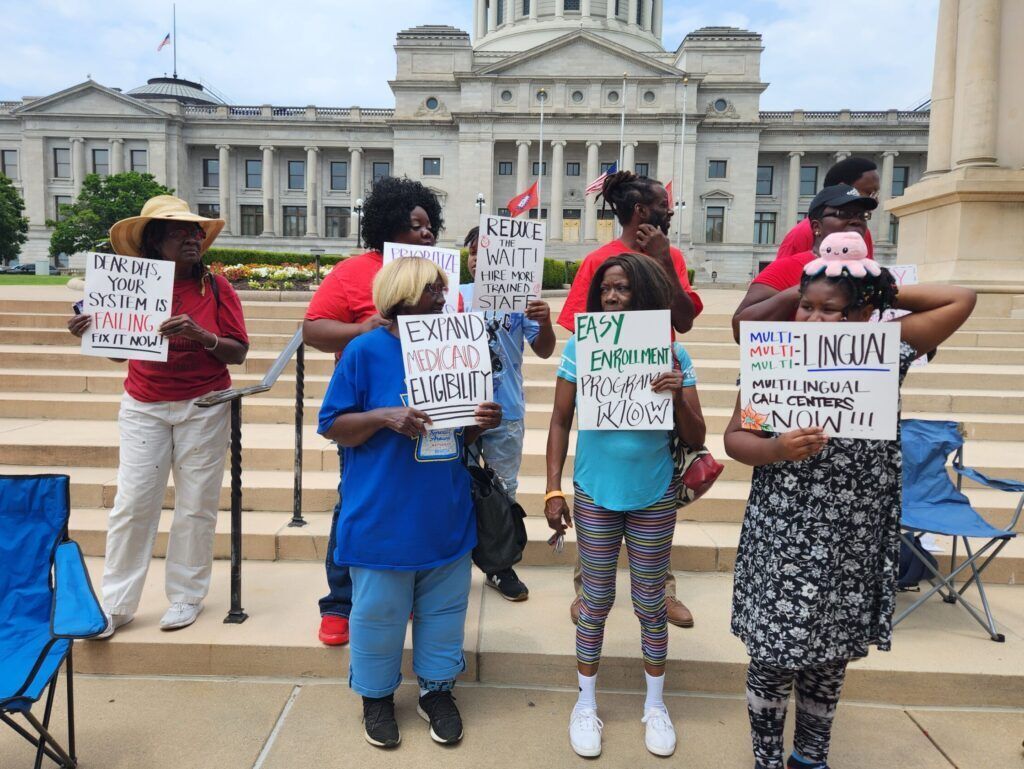Do you ever ask a restaurant server, gas station attendant, or grandmother's caregiver about their health insurance? There's a fair chance they are enrolled in Medicaid expansion, known here as Arkansas Works. Before the state expanded Medicaid in 2014, low-income Arkansans generally couldn't get treatment outside of an ER, whether it was for a bad case of the flu, a shoulder injury, mental health, or breast cancer. And if they somehow got treatment, they got crushing bills to show for it.
Through Medicaid expansion, around 240,000 Arkansans currently have health insurance. Most people enrolled--57 percent--have paying jobs. Another 35 percent have a disability or caregiving responsibilities. Others are in school. Insurance allows them to stay healthy so they can work or manage their disability and be involved in family and community activities.
Despite evidence showing that nearly everyone on the program works or has a major barrier to work, Arkansas in 2018 became the first state to put work reporting requirements in Medicaid. Congress did not approve these requirements, which makes them illegal and the subject of an ongoing lawsuit. Legalities aside, these burdensome red tape requirements are termination traps that strip away health insurance and leave people less able to get ahead.
In the first five months of the requirements, 18,164 people lost insurance because they went three months without reporting work or an exemption (the three months do not have to be in a row). That's about three out of every four people who had to report.
Many of those terminated were working and using insurance. Take Adrian McGonigal. He had his best-ever paying job in the shipping department of a poultry plant. As long as he got medication to cover his Chronic Obstructive Pulmonary Disease, he could work. After the state introduced reporting requirements, Adrian got confused, missed reporting, and lost insurance. Unable to pay $900 out of pocket for prescriptions, he wound up in the ER several times in a few weeks. His employer tried working with Adrian but finally had to let him go. Adrian had no income, bounced between homes of different relatives, couldn't breathe properly, and couldn't sleep more than three hours per night. He recently got his insurance back, but he's not back on his feet. He's now looking at part-time fast-food jobs that pay much less than he earned before.
Adrian isn't an exception. The best available data suggests that for every one person who is not working or doesn't meet an exemption, the state is cutting off two people who do. Initial studies from Kaiser Family Foundation show that many people don't know about the requirement, don't understand it, or have difficulty complying.
One problem is the state's notoriously bad reporting system. You have to click through several screens with unclear icons just to get to the login page. You have to put in a reference number that DHS may have sent you in a 10-page letter a few months before. That number may or may not work.
If you manage to sign on, there are dozens of confusing options to choose from and clicks to make. And the website closes from 9 p.m. to 7 a.m. every day. If you don't sign in every month, you get frozen out of your account and have to wait through a long call-in process to get back in.
The state's new call-in reporting number isn't much help. Legal Aid recently called on a Saturday to help a client report and waited 30 minutes with no answer. Attempts during the week required multiple transfers and long wait times. It's no wonder that only about 20 percent of people who have to report are able to do so.
Still, the problems run deeper than Arkansas' poor implementation. People who already work or face obstacles to work now have to jump through extra hoops to maintain the coverage that gives them the best chance of being healthy enough to get or keep work. Why make it harder?
The state's data confirms that the threat of losing coverage is not encouraging anyone who isn't already working to work. Only a handful of people--313 in December, 371 in November--have newly reported work since being subject to the requirements. Even then, there's no evidence they did so in response to the threat of having their coverage taken away or that these jobs will meet the requirements or push them up the economic ladder. And since the state invested no additional money in job training, there's no chance that the new reporting requirements gave people skills to obtain jobs they couldn't get before.
Legal Aid works with thousands of low-income Arkansans in all sorts of situations. Whether it's someone fleeing domestic violence, an aunt taking care of a child who's not her own, an older person trying to get out of a debt collection scam, or a construction worker trying to get wages owed, our clients do the best they can with what they've got.
Low-wage workers don't get consistent hours. They can be let go at any time for nearly any reason. As a result, they move in and out of jobs. Many don't meet skill requirements for better jobs with insurance or higher pay. Many don't have reliable transportation to travel the miles from rural homes to where jobs are. Child care is expensive and hard to come by. If someone manages to stay afloat in these circumstances, a modest car repair, a sick child, personal illness, or a cut in hours can drag someone back down.
Consistent health coverage helps people on Arkansas Works be healthy enough to work and make a better life. The last thing they need is another way to get tripped up and set back. A real path out of poverty is not paved in red tape.




